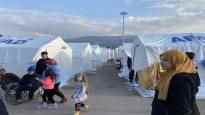Survivors of the devastating earthquake in Turkey are housed in tents, and containers are built for them as temporary accommodation. However, many are still sleeping under the open sky, when almost three weeks have passed since the first earthquake.
27 years old in southern Turkey, Hatay province Hasan Suner still slept in his car last week. There have been enough other relief items, but nothing to stay in. You couldn’t go to the home in Defne, Hatay, because it was damaged in the aftershocks and could collapse.
– We live in our neighbor’s yard. Our friends from another town sent us a tent with their own help, but we had to give it to my aunt, who has three small children. So we sleep in the car. The lack of tents is a common problem in other towns in our region as well, Süner told STT by phone.
His wife and many other local women and children had been sent to safer cities as the aftershocks continued. Some of the men had stayed behind to guard the houses against thieves.
– I don’t blame anyone, because maybe the authorities were surprised by the destruction, but we really have a shortage of tents. We have received enough food, water, blankets, soap and clothes, but the tent is missing, Süner stressed.
Süner is a grocer by trade, so he had food supplies in stock. After the earthquake, he distributed them as grants to other survivors – this kind of mutual aid has been important when grants and help from the authorities have been delayed.
Immediately after the earthquake, residents in Hatay also helped victims from the ruins while waiting for rescue workers and buried their dead by themselves. Since then, rescuers from dozens of countries around the world participated in the rescue work.
The authorities’ slowness in organizing accommodation and delivering aid has drawn much criticism from the opposition at a time when Turkey is preparing for crucial elections for the president Recep Tayyip Erdogan in terms of the continuation of the administration.
Container cities are being built for thousands
The World Health Organization WHO has called earthquakes the worst natural disaster of the century in the region. Turkey’s major accident and emergency agency AFAD said on Friday that the death toll from the earthquakes recently exceeded 50,000 people. The currently known death toll in Turkey is 44,218. There are at least 5,914 victims in Syria.
According to AFAD, it is difficult to estimate exactly how many people became homeless in Turkey. According to the agency, temporary accommodation has been arranged for more than 1.5 million people. Like Hasan Süner, several people cannot use their homes due to the risk of collapse.
According to the agency, more than 1.2 million people have been placed in tents so far. In addition, more than 320,000 people have been accommodated in hotels, public buildings and school dormitories elsewhere in Turkey.
The first container city has also started to be built in Gaziantep’s Islahiye. According to the authorities, a total of 5,000 containers intended for temporary accommodation will eventually go up in the city, each of which can accommodate one family or more people. In Turkey, similar huge container villages have been built for Syrian refugees in the past.
The news agency IHA, which is close to the administration, published a news video last week that showed containers at a construction site and also said that two other container villages are under construction in Gaziantep.
President Erdogan has also promised to hurry up the reconstruction of the cities that suffered destruction in the earthquake – although according to many urban planners, it would be safer to proceed with moderation in the construction.
– God willing, in March we will start construction and renovation work in the entire earthquake area and erase the traces of this great disaster, Erdogan tweeted on Tuesday.
Diseases are also a risk in temporary accommodation
Those who have been admitted to temporary accommodation, on the other hand, have a new serious concern: diseases. In its report last week, the European Center for Disease Prevention and Control ECDC warned of disease risks in temporary accommodation in the earthquake area, where many people live in a cramped area.
The center especially warned of the danger of cholera, especially in northwestern Syria. Aid has been getting there even more slowly due to the effects of the 12-year war, and thousands of people fell ill with cholera already last fall.
Even in Turkey, aid workers and healthcare staff have complained about poor hygiene.
– The problem is getting clean water, going to the toilet and getting clean underwear, he said To Leyla presented by a nurse on the Turkish-language online news channel operated by Deutsche Welle.
Journalists who worked in the earthquake area have said that there are still not enough field toilets for everyone and people have had to relieve themselves by the roadside.
The Turkish Ministry of Health has assured that it takes the risk of communicable diseases seriously. Minister of Health Fahrett’s Koca published a video on Twitter this week that showed a mobile laboratory in Hatay province and laboratory workers examining samples taken from different cities in the disaster area.
– We closely monitor the risk of infectious diseases and continue to bring clean water to the area. Water samples are monitored all the time. Currently, tap water is not used at all, the Ministry of Health told STT on Thursday.
